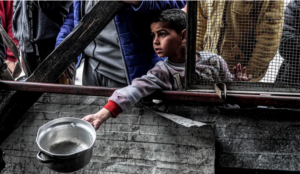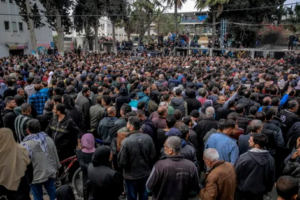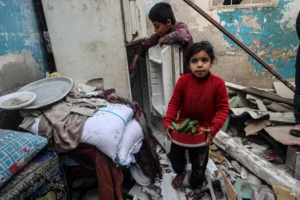If Gaza’s children starve, Israel will lose its moral legitimacy forever

A Palestinian boy holds out an empty pot in a queue for meals provided by a charity ahead of the fast-breaking iftar meal during Ramadan, Rafah, March 2024
David Rothkopf writes in Haaretz on 21 March 2024:
The fighting in Gaza must stop. Not tomorrow. Today.
All available resources must immediately be directed to stopping the unprecedented famine that is underway in that embattled sliver of land that has already seen unspeakable suffering. As bad as the Hamas attack on Israel on October 7 was, the people and government of Israel must now recognize that today not just the country’s security but its legitimacy are at stake as never before.
Should Israel continue the fighting and thus impede aid operations, should it continue to restrict those operations in any way, it will be seen as the primary author of one of the greatest humanitarian crises we have seen in modern memory.
Make no mistake, the horrific consequences of Israel’s action in Gaza to date will be a hard legacy for the nation to bear and one that will likely take decades and perhaps generations from which to fully recover. But what we have seen to date may pale in comparison to what is yet to come if the gravity of the current situation is not recognized and responded to with the utmost urgency.
The Netanyahu government is apparently blind to this reality, ready to compound its disastrous decisions and outright crimes with something even worse.
While the prime minister continues to obstinately and recklessly focus on pressing forward with a major new military operation in Rafah, against the objections of the Biden administration, and as it seeks to shift blame for the humanitarian crisis in Gaza to Hamas, it once again is showing the same blindness to a looming, grave threat that it did prior to the Hamas terror attack. Except this time the threat is even more dire both in human terms and terms of the potential long-term consequences of failing to address it.
The international community’s warnings to date of the potential for famine have been all but ignored by Israel. Its response have been wholly inadequate. In recent days, the alarms have been growing much louder because the situation on the ground is unfolding just as the prior warnings foretold.
The Integrated Food Security Phase Classification (IPC) is the international initiative by which global food crises are assessed. In December it warned that a famine may occur by May if steps were not taken to aid the people of the region. Its most recent reassessment has however, moved the date for the onset of such a calamity forward to as soon as this month. It stated plainly that “famine is imminent as 1.1 million people, half of Gaza, experience catastrophic food insecurity.”
But even that chilling warning understates the gravity of the situation. U.S. Secretary of State Antony Blinken, who has been actively and repeatedly warning of the need to prevent this outcome since before Israel’s ground operations in Gaza began, referred to the IPC report when he stated, “According to the most respected measure of these things, 100 percent of the population in Gaza is at severe levels of acute food insecurity.” He went on to note “that’s the first time an entire population has been so classified.”

Palestinians queue during the distribution of humanitarian aid in Gaza City, March 2024
In response, members of the U.S. Senate have called for an immediate cessation of Israeli military operations to enable the international community to take the steps to address the rapidly deepening crisis facing the people of Gaza.
Experts note that because humanitarian organizations are “very cautious about using the term ‘famine,'” calling the crisis “imminent” is misleading, because when those groups formally declare it is imminent, in practical terms the famine is already well underway. That is why, for example, Refugees International, has chosen to say that the famine is already “getting underway” meaning that “famine-level hunger is widespread, malnutrition as well, deaths are beginning.”
Former USAID Administrator Gayle Smith told me, “We are already seeing death by starvation and are looking at an accelerating trajectory towards famine from now through May and likely catastrophic famine by July.”
Jeremy Konyndyk, president of Refugees International, said, “When children begin dying of evident starvation, as we’re now seeing, that is indicative of extreme, sustained deprivation. Given the overwhelming levels of food deprivation and rapidly accelerating malnutrition in the latest reporting (doubled since January), this famine is building momentum very rapidly.
“There will a lot of kids right now who are at the level of advanced malnutrition that the dying kids were approximately four weeks ago. The numbers will keep rising until something major changes the trajectory.”
What does that mean in terms of numbers? Konyndyk explains. “I suspect that even with an immediate and fully robust intervention we’d still see starvation-related deaths in the thousands. If such a response takes another month or more to roll out, I wouldn’t be surprised to see death tolls in the tens of thousands.
“As a reference point, the mortality threshold for a famine declaration is 2 deaths per 10,000 population per day, which is an extremely high level. In northern Gaza that would be 60+ dying per day, which feels plausible given the conditions there. At that level, the 300,000 people in northern Gaza alone would exceed 1,000 dead in 17 days. “If this drags out for another few months, and half the population reaches the level of deprivation that exists in the north – again, plausible – it’s not hard to see a path to tens of thousands dead. If cholera were to hit (so far, mercifully, it hasn’t) those numbers would get much higher.”
“It’s important to understand the trajectory of famine,” observed Smith, drawing on her USAID experience. “People facing food insecurity fall back on a series of coping mechanisms – they eat whatever they have in store, sell their assets to generate cash to buy food, go from two or three to one meal a day, and adults eat less so that children can eat.
“As the ability to counter food insecurity decreases, malnutrition increases. Famine happens when there are no coping mechanisms left and malnutrition has reached life-threatening levels.
“We will see a huge number of deaths but also effects for years to come,” she continued. “We will see an increase in stunting among children under 5, and infants are particularly at risk as we know that the nutrition available – or not – during the first 1000 days in a child’s life shapes that child’s ability to thrive and learn over a lifetime.” The psychological costs of famine, including long-term learning challenges, endure for decades after a serious famine.

A Palestinian child carries vegetables as another tries to salvage more from a refrigerator inside their damaged home, following overnight Israeli bombardment in Rafah in southern Gaza, March 2024
Smith gave further examples of famine’s cost in lives and human development. “In famine or near-famine conditions, other ailments are more lethal. And economic recovery is often elusive, as after most famines, people are unable to restore lost assets for decades, so there is rarely a return to ‘normal’ and if they do survive, most people are left more vulnerable than they were before the onset of a crisis.”
All the experts with whom I spoke stated that so far the response to Gaza’s famine has been wholly inadequate – both from Israel and from an international community hindered by the fighting and other Israeli impediments to intervention. It has lacked the needed “large interventions to restore food access at scale,” comprehensive malnutrition interventions, adequate supplies of clean water and provision of health care that are essential.
Smith argued that it is high time that the international humanitarian organizations that specialize in addressing such crises be given the support and freedom they need to operate in Gaza. That means an end to the fighting, indefinitely. “If the race to avert catastrophic famine is lost,” she states, it will not be the fault of aid groups: Responsibility should be laid firmly at the feet of the politicians whose responsibility it is to create such conditions.
That means, first and foremost, the Israeli government. But it also means all the nations of the world who are in a position to help, right now. The blame-shifting and inflamed rhetoric and political posturing and disastrous decision-making that have brought us to this awful point must stop. Fundamental decency requires it.
But so too does the recognition that the failure to effectively intervene now to end the humanitarian catastrophe in Gaza will be a moral stain on the reputation of Israel from which the country may never recover.
David Rothkopf is a former senior U.S. government official and the author of ten books on foreign policy and politics.
This article is reproduced in its entirety
